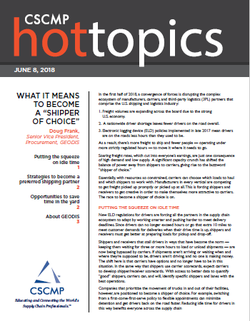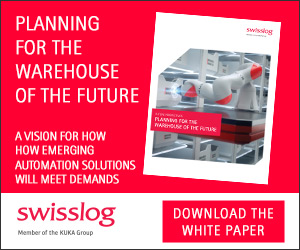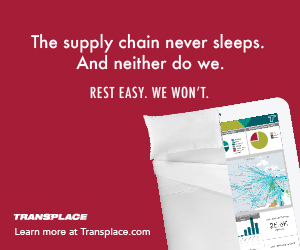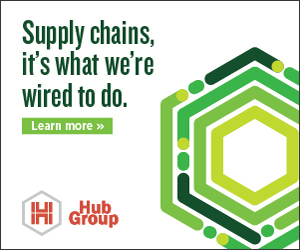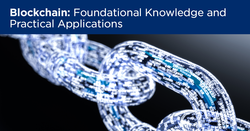CSCMP's 29th Annual State of Logistics Report, authored by A.T. Kearney and presented by Penske Logistics, debuted today, June 19, 2018, in Washington, D.C., and offers various unique insights into a stronger U.S. economy. The Annual State of Logistics Report®, has tracked and measured all costs associated with moving freight through the U.S. supply chain since 1988. Each year, the report presents an overview of the economy during the past year, the logistics industry’s key trends, and the total U.S. logistics costs for the previous year and lays out future and potential trends. Here are some of the key highlights of the 29th Annual State of Logistics Report®: • United States business logistics costs, also known as USBLC, is at $1,1494B or 7.7% of Nominal GDP in this year's report. • The costs of shipping goods and services is rising, as seen by increased capacity rates, which is leading to higher supply chain costs for corporations, and the consolidation of smaller trucking and logistics companies that cannot keep pace. Challenges in this space have resulted in high-level technological innovations that have shaken the industry out of outdated stereotypes. Rising fuel costs also factor into the equation. • The continued growth of e-commerce pushed parcel shipment volume up by 7% in 2017, to nearly $100 billion; forecasts expect that to rise at similar levels for the next few years. This has a strong effect on the supply chain, in the areas of more visibility for both the corporation and the customer; the need for more warehousing which in many cases will be smaller and closer to large population centers; and designing more responsive and flexible logistics networks, just to name a few. • There is a continuing truck driver shortage in the transportation industry, which has a multitude of effects, one of which could be slower package delivery times for Americans, who by the day order increased goods and services online. Trucks transport 70% of consumer goods in this country. • Speaking of technological innovations in the supply chain, here are several exciting concepts that look to have high impact across the next decade: uberization of freight; blockchain; fully autonomous trucks; artificial intelligence applications; truck platooning; electric vehicle fleets; autonomous mobile robots; and drone and unmanned aerial vehicle delivery systems. The report for the last 29 years has provided a snapshot of the national economy through the lenses of the all-important supply chain and is accomplished through a rigorous compilation of leading logistics intelligence around the world; a spotlight on industry trends; while offering key points of view on the supply chain sector. This report is a CSCMP member benefit. Click below to download your complimentary copy of the full report today.
|
Over the past few years, CSCMP and NASSTRAC, a professional organization focused on shippers and transportation, have been working closely together on a variety of projects and discovered that there were significant synergies between the two associations and felt that there were opportunities for the two to complement one another and provide additional value to their respective members in meaningful ways. "NASSTRAC's focus on transportatoin, given the environment, the dynamic around transportation, and a focus on it, will help us bring more education, content and thought leadership to that part of the supply chain. From CSCMP's Annual State of Logistics Report, we know that transportation is 65% of the total logistics cost. This match makes a lot of sense for our combined membership and for the scale and focus that it will bring." Rick Blasgen, CEO and President, CSCMP.
The Council of Supply Chain Management Professionals (CSCMP) is proud to announce the arrival of CSCMPodcast: Supply Chain Conversation to the iTunes store! CSCMPodcast is our latest platform for bringing you the latest and trending insights from the industry’s top professionals! In our first episode, Nichole Mumford, Director of Marketing and Professional Development, CSCMP, and Brad Blizzard, Executive Director – Logistics, and President of Bridgestone Americas Fleet Operations, LLC, discuss the unique supply chain footprint in Nashville and touch on some of the biggest challenges facing supply chain professionals today. Click "Learn More" for more details and options for listening.
|
In the first half of 2018, a convergence of forces is disrupting the complex ecosystem of manufacturers, carriers, and third-party logistics (3PL) partners that comprise the U.S. shipping and logistics industry: 1) Freight volumes are expanding across the board due to the strong U.S. economy. 2) A nationwide driver shortage leaves fewer drivers on the road overall. 3) Electronic logging device (ELD) policies implemented in late 2017 mean drivers are on the roads less hours than they used to be. As a result, there’s more freight to ship and fewer people — operating under more strictly regulated hours — to move it where it needs to go. Soaring freight rates, which cut into everyone’s earnings, are just one consequence of high demand and low supply. A significant capacity crunch has shifted the balance of power away from shippers to carriers, giving rise to the buzzword "shipper of choice." About the author: Doug Frank, Senior Vice President, Procurement, GEODIS Americas, is a former Captain in the US Army with 30 years of supply chain industry experience. Since joining GEODIS in 2011, Doug has led the carrier management, transportation solution design, financial settlement and procurement teams. CSCMP Hot Topics are a member benefit. Click the link below to download your copy of this month's CSCMP Hot Topic, What It Means to Become a 'Shipper of Choice'.
|
Congratulations to the following professionals for achieving SCPro Level One Certification, CSCMP's supply chain certification developed by and for the industry's thought leaders. Angela Socha, Schreiber Foods Keri Paris, Schreiber Foods Jake Kozup, Schreiber Foods Hannah Nohr, Schreiber Foods Michael Fox, Schreiber Foods Daniel Fischer, Schreiber Foods Ready to join their ranks? Click "Learn More" for information on CSCMP's supply chain certifications.
|
The unbiased, curated content of CSCMP's annual conference, EDGE, is only one of many reasons to attend supply chain's premiere event! EDGE 2018 is comprised of 22 tracks and over 100 educational session topics. Each session topic is thoughtfully constructed to not only address trends and hot topics, but to provide solutions and answers. This is an event like none other, presenting you with unlimited opportunities to learn from industry experts, hear dynamic speakers, and network with the most influential supply chain leaders in the world. Click "Learn More" to access a promotional code and save $300 on your EDGE registration
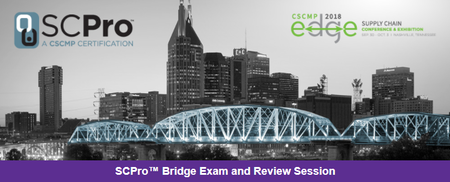 NEW! This year at EDGE 2018, CSCMP will be hosting the first ever review session and live examination for the SCPro™ Certification Bridge Exam. The SCPro™ Bridge Exam leverages the knowledge and credentials already earned by supply chain professionals by recognizing credentials like other supply chain certifications and advanced degrees. About the review session: On Sunday, September 30, from 2:00-5:00 p.m. CT, Dr. Brian Gibson of Auburn University will host a review session as preparation for the SCPro™ Bridge Examination. Professor Gibson will lead participants through a review of the information covered on the exam and answer questions about the exam. About the SCPro™Bridge Exam: The SCPro™ Bridge Exam is an abbreviated version of the SCPro™ Level One Exam. It is based on the eight learning blocks of the end-to-end supply chain as defined by CSCMP. Individuals who achieve a passing score on the SCPro™ Bridge Exam will be designated as SCPro™ Level One Certified.
Join CSCMP Strategic Partner, GS1 US, for a complimentary webinar on blockchain. Forget the Technology, Focus on Business Transformation. Regardless of your industry, blockchain is the hot new buzzword captivating the attention of many companies. In this non-technical, cross-industry session, Melanie Nuce, GS1 US SVP of Corporate Development will: • Provide an industry-agnostic primer on what blockchain is and what it is not—separating fact from fiction on what it can actually deliver. • Focus on the practical business applications of blockchain to help companies see the value and future of this evolving data sharing technology. • Discuss where the opportunities exist in each industry vertical, and what could be the best next steps to take for companies interested in exploring the capabilities of distributed ledgers. • Demonstrate why GS1 Standards are the basic building blocks of supply chain visibility—a necessary foundation for blockchain that helps us accurately link people, places, and things. Armed with the right information, you’ll be able to better understand the value of blockchain and how it fits into an entire ecosystem of data sharing before jumping immediately to its application. Join us on Wednesday, July 25, from 2:00 to 3:00 p.m. ET, to gain a better understanding on blockchain fundamentals. Can’t attend in person? Register anyway, and we’ll send you a link to the webinar recording to watch at your leisure.
|
On Thursday, June 21 and Thursday, June 28, EPA is hosting two webinars to help you as a shipper improve performance and build strong relationships with your carriers. The first webinar will introduce you to tools that will help you understand the efficiency of your freight operations. You will also learn about the SmartWay Carrier Performance Ranking reports and how this information can be used to make effective business decisions helping you reduce your environmental impact. The second webinar will discuss what carriers have cited as critical attributes of a "shipper of choice" and how this could improve carrier relations, helping shippers attract and keep quality service providers.
 The rising cost of transportation has created strife between shippers and carriers as they leverage the economics of supply and demand at the expense of each other. According to a new study from the University of Tennessee Knoxville’s Global Supply Chain Institute, this inherit conflict undermines a company’s ability to meet its supply chain and financial goals. "With the rise of e-commerce and consumer expectations, cost can no longer be the primary focus in transportation," says Mary Holcomb, Gerald T. Niedert Supply Chain Fellow and Professor of Supply Chain Management at the Haslam College of Business. "Transportation must be treated as a strategic element of the business plan and the end-to-end supply chain in order for companies to remain competitive in a digital economy." The research shows shippers who have appropriately aligned transportation with their business model have significantly better performance than those who have not. The report identifies seven best practices in transportation for creating this alignment and three megatrends businesses should adopt by 2025 to remain competitive. All the companies surveyed have created value from Lean methodologies and established a culture for driving transportation excellence. Other common best practices included creating strategies for long-term transportation partnerships with carriers, leveraging intermodal capabilities, customizing services to meet emerging needs, leveraging digital technology and bundling services for growth.
The challenge of finding enough high quality and reasonably priced trucking capacity is as daunting as ever. The surging economy and rising consumer demand has created even more pressure. Earlier this year, Wall Street Journal Logistics reported that one truck was available for every 12 loads needing to be shipped, making this the most unbalanced market since October 2005. The Federal Motor Carrier Safety Administration’s April 2018 rule requiring most commercial truck drivers to record their hours of service via Electronic Logging Devices (ELDs) has tightened capacity further (by 5% to 8%, according to FTR Transportation Intelligence). Even though last year was tough, this year might be even tougher. A report in MarketWatch stated that in December 2017, carriers charged an average 22% more than they did a year ago in the spot market. All of this has reinforced the concern that there is not sufficient capacity in the marketplace. In two parts, we’re going to explore this issue, and specifically, how digital freight services are using new approaches based on advances in technology and data to help counter the capacity crunch: Part 1 (this issue): Technology and data will help the industry be more attractive for drivers and carriers Part 2 (next issue): Technology and data will make the drivers and carriers we have more efficient. About the author: Dan Lewis, Co-founder and CEO, Convoy
When companies start incorporating "deep learning" forms of artificial intelligence into their supply chain systems, they will be able to autonomously analyze past supply chain failures and attempt to prevent new ones. THE SELF-LEARNING SUPPLY CHAIN marks the next major frontier of supply chain innovation. It’s a futuristic vision of a world in which supply chain systems, infused with artificial intelligence (AI), can analyze existing supply chain strategies and data to learn what factors lead to supply chain failures. These AI-driven systems then use this knowledge to predict future supply chain problems and proactively prescribe or autonomously execute resolutions. While there is still a way to go before the self-learning supply chain is a reality, recent advancements in AI suggest it is no longer "blue-sky thinking."
"CSCMP has provided me a robust professional network which I would never have without this great organization. I know that I can reach out to any executive or VP I have met through CSCMP and discuss benchmarking, career advice or strategy recommendations. Furthermore, my leadership experience with the Young Professional group and EDGE Conference board has enabled me to practice and evolve my management skills in a safe space, as well as grow and support an organization I am passionate about." Thomas Shield Supply Chain Manager – Project Management Kohler Co. Volunteering exposes you to a whole new network. Meet accomplished supply chain professionals. Expand your network. Create business opportunities. When you volunteer with CSCMP, you can get involved in what interests YOU! Get involved today by volunteering through your local roundtable.
|
|

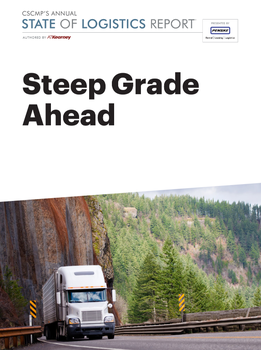
.jpg)
